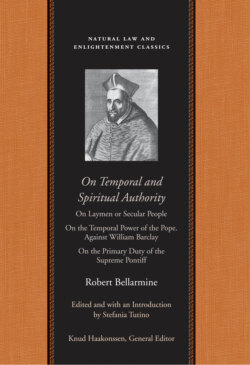Читать книгу On Temporal and Spiritual Authority - Robert Bellarmine - Страница 9
На сайте Литреса книга снята с продажи.
On the Primary Duty of the Supreme Pontiff
ОглавлениеThe division within the Catholic camp that Bellarmine’s theory provoked is indeed one of the clearest indicators of its relevance in early modern Europe. Bellarmine’s potestas indirecta did not simply reaffirm papal authority against the heretical denial of any such authority in spiritual or temporal matters. Rather, it did so in a manner that would allow the pope to retain his preeminence in a European context in which the Protestant churches as well as the increasingly strong European monarchies, both Protestant and Catholic, could jeopardize it. If the pope wanted to maintain supreme spiritual authority, he had to give up direct control over European subjects and concentrate on indirect direction of politics. While the first two texts in this edition clearly show the political and theoretical implications of Bellarmine’s theory, the third text deals with Bellarmine’s views on the dynamics of power within the Roman Curia. This is a memorandum, On the Primary Duty of the Supreme Pontiff, which Bellarmine gave to Pope Clement VIII in late September or early October 1600. It was never published but circulated widely in manuscript form.25
The memorandum concerned the need that Bellarmine saw for implementing a key aspect of Church governance that was decided at the Council of Trent, namely the enforcement of bishops’ residency in their dioceses. This was necessary, according to the cardinals at Trent, to ensure an effective chain of communication from Rome to the periphery of the Catholic world.26 Bellarmine framed the issue of episcopal residency in the context of the relationship between the pope’s spiritual authority and the papacy’s political interests. Bellarmine began his memorandum by stating: “The Supreme Pastor has three roles [personae] in the Church of God: he is the pastor and rector of the universal Church, the bishop assigned to the city of Rome, and a temporal prince of an ecclesiastic dominion. But among all his duties the care for the universal church is in first place; indeed this is his first, unique, and greatest duty.” One of the ways in which the pope could fulfill such a duty was by making sure that the appointment of bishops was made for spiritual reasons, not for political and economic gain, as “churches should be provided with good prelates, and not prelates with good churches.”
Similarly, Bellarmine took issue with the bishops who served as apostolic nuncios and who, because of their international engagements, “have not seen their churches for many years.” This practice sacrificed the spiritual interest of the Catholic Church to the political interest of the papacy, and Bellarmine suggested that a shift in priorities on the part of the pope would benefit the spiritual supremacy to which he, as “pastor and rector of the universal Church,” was entitled and which should be his primary concern. In the text we have included the pope’s far from warm response to each issue raised by Bellarmine, and we see that Clement was not willing to give up his direct political authority in the administration of the Roman Church over his own house, so to speak. “Regarding nuncios,” the pope replied, “we think that it is most appropriate that the nuncios are bishops, because they command bishops and they have a greater authority with the princes and peoples.”
Bellarmine understood perfectly well that the Church of Rome was not just a spiritual institution, but he thought that the future of its supremacy depended on its spiritual authority and he tried to redefine how much political authority it could afford without losing its spiritual primacy. For the pope, such redefinition might indeed be historically and theoretically necessary, but it was costly for the day-to-day political and administrative interests of the Church. When Bellarmine suggested that a bishopric had become a job to be grabbed rather than a duty to be fulfilled, the pope replied that theory was very well, but the “practical aspects” of running the Catholic Church could not be carried out from spiritual considerations, especially when it came to administering the Church’s provinces through the bishops.
The contrast between Clement VIII and Bellarmine in this text complements the other controversies over the theory of the potestas indirecta involving Protestant monarchies, Catholic monarchies, and central protagonists of the Roman Curia. This is because Bellarmine’s potestas indirecta was a profound and far-reaching attempt at reconsidering and reshaping the universal Church’s self-understanding and internal operation as well as its universal, “catholic” role with respect both to the Protestant churches and to secular authority. Neither the Roman Church nor the European monarchies embraced Bellarmine’s theory wholeheartedly, which is a further testament to the dominant place that Bellarmine’s theory occupies in the historical and theoretical process of defining the boundaries between power over bodies and power over consciences.
